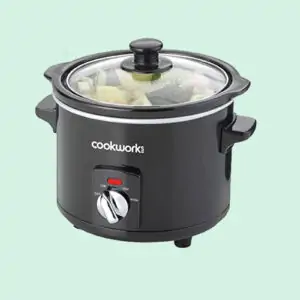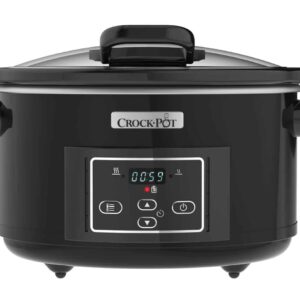In today’s world, energy efficiency and cost-effectiveness are vital considerations for any household. With numerous appliances on the market, choosing the right one can be daunting. One such dilemma is deciding between a slow cooker and an electric oven – slow cooker vs oven. In this blog post, we’ll delve into the differences between these two kitchen appliances, comparing their energy consumption, costs, cooking times, versatility, and environmental impact to help you make an informed decision.
JUMP TO:
Key Takeaways
- Slow cookers are energy-efficient and cost-effective, with low running costs and an average energy consumption of 1.3 kWh over 8 hours.
- Electric ovens offer precise temperature control, even heat distribution, faster preheating times & versatility in cooking methods for approximately £2 per 4 hours.
- Consider factors such as cooking preferences, efficiency & environmental impact to make an informed decision that suits your needs when selecting the right appliance.
Our Favourite Slow Cooker?
Morphy Richards Sear and Stew 3.5-Litre
Slow Cooker Vs Oven: Energy Consumption

Many people are concerned about energy consumption because it affects our environment and finances. Slow cookers are known to be more energy-efficient, consuming between 75 and 210 watts of electricity, depending on the setting. On the other hand, electric ovens have a higher energy usage, requiring 2,000-5,000 watts to operate. This significant disparity in energy consumption is an important consideration when weighing these two appliances against each other.
Not only are slow cookers more energy-efficient, but they also prove to be more cost-effective. The hourly cost of using an average-sized slow cooker in the UK, based on 2022 electricity rates, is about 4.5p per hour or a total of 36p for eight hours of use. In contrast, electric ovens can be more expensive, making slow cookers more economical for those prioritising energy efficiency and cost.
Slow Cooker Energy Usage
Slow cookers have a power rating that ranges between 75 and 210 watts of electricity, depending on the setting. They typically heat up to a temperature range of 170-300 degrees Fahrenheit, enabling the food to be slow-cooked and become tender gradually. The main difference between a slow cooker’s low and high settings is the time required for the food to reach its maximum temperature, allowing for minimal food preparation.
Over a period of eight hours, the average energy consumption of a slow cooker is approximately 1.3 kWh. This energy-efficient design makes slow cookers an excellent choice for those looking to save on electricity bills and minimize their environmental impact. The low energy consumption also means that slow cookers are cost-effective for extended cooking times, as they require less energy to heat food.
Electric Oven Energy Usage
Electric ovens generally demand 2,000-5,000 watts, considerably more than slow cookers. However, remember that electric ovens may cook certain foods quicker and more proficiently, depending on the dish and cooking technique. An average electric oven consumes between 2.0 and 2.2 kWh of energy during an eight-hour cooking period.
While electric ovens have higher running costs due to their energy consumption, they offer more versatility in cooking methods, making them suitable for a range of dishes. Some advantages of electric ovens include the following:
- The ability to bake, roast, broil, and grill
- Precise temperature control
- Even heat distribution
- Faster preheating times
The cost of cooking the same dish for four hours in an electric oven with a power rating of 1.8kWh at 150°C is just over £2. Despite the higher energy usage, electric ovens can be a valuable addition to any kitchen, providing efficiency and flexibility for different recipes.
Cost Comparison: Slow Cooker Vs Oven

When comparing the costs of using a slow cooker and an electric oven, it’s essential to consider energy usage, appliance costs, and cooking times. Slow cookers are typically cheaper to operate and purchase, whereas electric ovens incur higher running costs but offer a broader spectrum of cooking techniques. An average oven costs 21p per hour to operate. That is 17p more expensive than a medium-sized slow cooker..
In terms of cost-effectiveness, you could cook five meals in a slow cooker for the same price as cooking one meal in an electric oven for four hours. This significant cost difference highlights the advantages of using a slow cooker for those prioritising energy efficiency and cost savings.
However, when choosing the appropriate appliance for your needs, it’s important to balance these factors against the adaptability and cooking techniques that electric ovens provide.
Slow Cooker Costs
Slow cookers are not just energy-efficient. They are also cost-effective. The slow cooker cost, estimated for running it for eight hours, is between 16 and 24 cents. This low cost, combined with the energy-efficient design, makes slow cookers an attractive option for those looking to save on energy bills and reduce their environmental impact.
In addition to their low running costs, slow cookers have the following benefits:
- They are generally more affordable, with prices starting at around sixteen pence, making a slow cooker cheaper than many other kitchen appliances.
- They have an energy-efficient design, which helps minimize kitchen appliance costs.
- They do not sacrifice the quality of meals.
Electric Oven Costs
Conversely, electric ovens bear higher running costs, averaging around 21p/hour. While they offer more versatility in cooking methods and can be more efficient for certain dishes, these benefits come at a higher price. The cost of an electric oven can range between £200 and £1000 or more, depending on the brand, model, and features.
When operating an oven for eight hours, the estimated cost is approximately $2.48, considering an average energy use of 2.4 kWh (31 cents) per hour.
Although electric ovens run at a higher cost than slow cookers, their adaptability and range of cooking techniques can render them a worthwhile addition to any kitchen, depending on personal needs and preferences.
Cooking Time And Efficiency
The cooking time and efficiency are key factors to take into account when drawing a comparison between slow cookers and ovens. Preheating, heat loss, and cooking duration can impact each appliance’s efficiency and cost-effectiveness. For example, ovens usually require 10 to 15 minutes to preheat, and heat loss occurs each time the oven door is opened during operation.

In contrast, slow cookers typically require 6 to 10 hours of cooking. This longer cooking time allows for the energy-efficient design of slow cookers to be cost-effective for extended cooking times. While ovens can cook some foods faster, preheating and heat loss can impact efficiency and cost-effectiveness.
Slow Cooker Cooking Time
Slow cookers usually need 4-8 hours to prepare meals, and some recipes may require more time. The energy-efficient design of slow cookers makes them cost-effective for extended cooking times, as they require less energy to heat food at lower temperatures. This long cooking time allows for slow cooking, which can result in more tender and flavorful dishes.
Despite the longer cooking times of slow cookers, their energy-efficient construction and cost-effectiveness render them a desirable option for those seeking to cut down on energy bills and lessen their environmental footprint. Slow cookers are also known for their hands-off cooking approach, allowing minimal food preparation and freeing you to focus on other tasks while your meal cooks.
Oven Cooking Time
Depending on the dish and cooking method, electric ovens may be able to cook some foods more quickly. However, preheating and heat loss can impact their efficiency and cost-effectiveness. Ovens typically require 10-15 minutes to reach the desired cooking temperature, and the cooking time may vary depending on the recipe and the food being cooked.
While electric ovens have higher energy usage and running costs, their versatility and range of cooking methods can make them a valuable addition to any kitchen. Some benefits of electric ovens include:
- The ability to cook foods faster and more efficiently
- More precise temperature control
- Even heat distribution
- No need for a gas supply
- Easy to clean and maintain
The ability to cook food faster and more efficiently can also contribute to a more sustainable kitchen, depending on individual needs and preferences.
Versatility And Cooking Methods
When comparing slow cookers and ovens’ versatility and cooking techniques, it’s important to consider each appliance’s strengths and constraints. Slow cookers are more energy-efficient and can be used to prepare various dishes, while ovens are more versatile and can cook a broader range of dishes. This versatility allows you to create diverse meals and cater to different dietary preferences and requirements.
When selecting the appropriate appliance for your needs, it’s vital to balance the advantages of energy efficiency and cost savings with the versatility and cooking techniques that electric ovens offer. By considering your cooking preferences, energy efficiency, cost, and environmental impact, you can make a well-informed decision that best suits your needs and lifestyle.
Slow Cooker Cooking Methods
Slow cookers are perfect for slow-cooking meals, as they help to retain moisture and flavour throughout the cooking process. However, adding them to the slow cooker may require additional preparation for certain ingredients, such as pre-cooking or pre-soaking. Additionally, it’s essential to employ the requisite amount of liquid when slow cooking, as excessive liquid can lead to the food becoming soggy.

Despite these limitations, slow cookers provide an energy-efficient, cost-effective solution for slow-cook meals with hands-off cooking and minimal food preparation. Their ability to cook meals longer allows for maximum flavour and tenderness, making slow cookers energy efficient and an excellent choice for busy households or those looking to save on energy bills.
Oven Cooking Methods
Electric ovens provide a larger variety of cooking techniques, including baking, roasting, and broiling, offering increased flexibility in the kitchen. Baking, for instance, is a relatively uncomplicated and direct cooking technique that can be utilized to create a range of dishes, though it can be time-consuming and less energy-efficient than other cooking techniques.

Roasting and broiling are also effective methods for cooking meats and vegetables, accentuating their natural flavours. However, these methods can be lengthy and not as economical as other cooking techniques, such as slow cooking.
When selecting an appropriate cooking method, it’s essential to consider the type of food being cooked, the amount of time available, and the energy efficiency and cost-effectiveness of each method.
Environmental Impact And Sustainability

When comparing these two kitchen appliances, it’s important to consider their environmental impact and sustainability. Factors such as energy consumption, waste reduction, and appliance lifespan can significantly impact the overall sustainability of each appliance. Slow cookers are more sustainable, given their energy-efficient design, reduced running costs, and capacity to diminish food waste by preparing bulk meals.
Conversely, electric ovens have a greater environmental impact due to their higher energy consumption. However, their versatility can contribute to a more sustainable kitchen overall, depending on the cooking methods employed and the source of electricity generation.
By considering each appliance’s environmental impact and sustainability, you can decide to match your values and priorities.
Slow Cooker Sustainability
Slow cookers have several sustainable advantages over electric ovens:
- They have an energy-efficient design, requiring less energy to heat food at lower temperatures.
- They consume less electricity and produce less heat, improving energy efficiency and cost-effectiveness.
- They can cut down on food waste through bulk cooking, reducing the amount of food that goes to waste.
With their extended lifespan and lower maintenance requirements, slow cookers are cost-effective and environmentally friendly, making them an attractive option for eco-conscious consumers. Their energy-efficient design and waste-reduction capabilities make slow cookers valuable to any sustainable kitchen.
Oven Sustainability
While electric ovens may have a greater environmental impact due to their higher energy usage, their adaptability can help create a more sustainable kitchen overall. Using renewable energy sources to power electric ovens can reduce their environmental impact and aid in diminishing greenhouse gas emissions.
Electric ovens are more energy-efficient than gas ovens, requiring less energy to heat up and maintain a consistent temperature. By considering the environmental impact of electric ovens and opting for renewable energy sources, you can contribute to a more sustainable kitchen and consciously reduce your carbon footprint.
Tips For Choosing The Right Appliance
Consider factors like:
- Cooking time
- Energy efficiency
- Adaptability
- Space
- Cooking style
When selecting the right energy-efficient appliance for your kitchen, consider your cooking preferences, energy efficiency, cost, and environmental impact. This way, you can make a well-informed decision that best suits your needs and lifestyle.
Slow cookers are typically more cost-effective and energy-efficient, making them a perfect choice for those aiming to reduce energy bills and lessen their environmental footprint. On the other hand, electric ovens offer more versatility in cooking methods, making them suitable for various dishes and catering to different dietary preferences and requirements.
Slow Cooker vs Oven: Summary
In conclusion, both slow cookers and electric ovens have their advantages and disadvantages, with slow cookers being more energy-efficient and cost-effective, while electric ovens offer greater versatility and cooking methods. By weighing these factors and considering your cooking preferences, energy efficiency, cost, and environmental impact, you can make an informed decision that best suits your needs and contributes to a more sustainable kitchen.
Frequently Asked Questions
Is It Cheaper To Run A Slow Cooker Or An Oven?
Overall, slow cookers are cheaper to run than ovens because they use significantly less energy. Slow cookers are also suitable for cooking with cheaper cuts of meat and vegetables, saving you even more money. However, size and cooking time should be taken into consideration when making an exact comparison.
Why Is A Slow Cooker Better Than An Oven?
A slow cooker is a great way to save money, time, and energy while cooking delicious meals. Plus, you can use it for batch cooking, so you’ll always have something ready to eat at the end of a long day – much better than using an oven! Slow cookers are incredibly versatile and can be used to make a variety of dishes, from soups and stews to casseroles and desserts. They are also easy to use and maintain, requiring minimal supervision during the cooking process.
Can I Use My Oven As A Slow Cooker?
Yes, you can use your oven as a slow cooker. Preheat the oven to 160 oC, follow the slow cooker recipe, and use a baking dish with a lid instead of a crockpot or slow cooker. If the recipe calls for a slow cooker setting, divide the cooking time by 4.
Are Slow Cookers More Energy-Efficient Than Electric Ovens?
Yes, slow cookers are more energy-efficient than electric ovens as they consume less electricity.
Can Electric Ovens Contribute To A More Sustainable Kitchen?
Electric ovens can be an important part of a sustainable kitchen if powered by renewable energy sources and used in an efficient manner.






